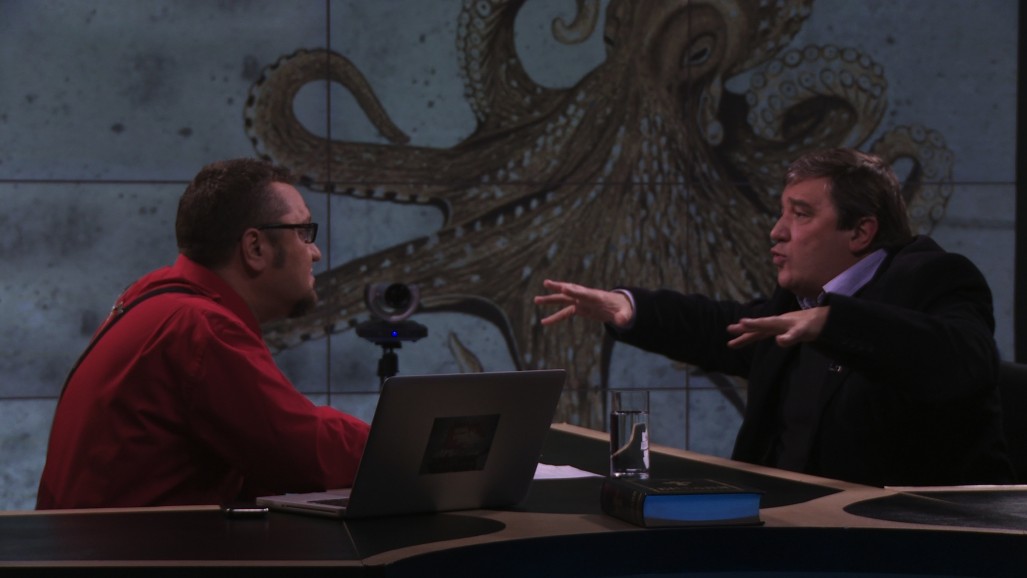Balabanov’s work is “a politically incorrect film
that speaks correctly about Europe’s political, economic
and moral problems as seen from and in Bulgaria”
Bulgarian director Gueorgui Balabanov has been living in France for many years but still closely follows developments in Bulgaria. His feature debut, The Petrov File, written by Oscar winner Jean-Claude Carrière, presented the country’s political transition through a story beginning in the 1980s and ending in modern-day Bulgaria. The film opened the 19th Sofia International Film Festival last year.
As part of the festival’s anniversary 20th edition Balabanov will present his newest work, a coproduction between France and Bulgaria. The film is a documentary story about events in Bulgaria in recent years. Et le Bal Continue is the director’s a brave view of the country’s development, its changing values and the consequences for society. The film follows the former Soviet satellite’s joining of the EU with hopes for the American dream deeply embedded in the psyche.
- Who are your characters and how did you choose their stories as the foundation your plot?
- My characters are the time we live in and city – Sofia with its inhabitants who have the ill fortune of living in this time. Of course the film has several main protagonists, a young woman who is an engineer, a famous TV journalist, a skeptical intellectual, a former MP, a retired colonel and his friend who is always a dissident and Bulgaria’s greatest pop-folk diva. I met one of the protagonists especially for the occasion and it was difficult for me to convince them. Now we’re good friends, as with all the others.
- What was you approach in making your idea happen – how did you manage to draw the attention of ARTE Franceand Ladybirds Films for the topic of Bulgaria’s current situation?
- I’ve worked with ARTE France many times, our relationship goes back a long time. And I drew their attention by just going there with a few pages and pictures of the protagonists and they, that is the head of ARTE’s documentary department said, after reading the synopsis, Yes! Of course, things aren’t always so simple! There’s also an editorial board that needs to decide and another one at the headquarters in Strasbourg but what’s important is that someone believe in the author and the project and stand behind them. The second such person was producer Helene Badinter, the manager of Ladybirds Films whose contribution to the film was enormous. She’s the best film producer I’ve worked with and I’ve worked with many… As for Bulgaria as a subject, I’ve mostly made films (with a few exceptions) about Bulgaria and people’s life here. ARTE is a French-German channel and is the biggest and most serious public television in Europe. Apart from its channels it also finances many feature and documentary film projects, including the so called grand format – full-length films on serious political and social issues in Europe and around the world. Et le Bal Continue is precisely such a film. It looks at Bulgarian society as a European society, at Bulgarians as Europeans (although not quite, as one of Aleko Konstantinov’s protagonists puts it). Et le Bal Continue is a politically incorrect film that speaks correctly about political, economic and moral problems in Europe as seen from and in Bulgaria.
- Do you have anything interesting to share with us about the making of Et le Bal Continue?
- Maybe not interesting but exciting, yes. We were shooting a group of homeless in front of a lorry of a charity organization. They were waiting in the cold to get something to eat. The organization representatives didn’t mind us shooting, it was good publicity for them but one of those queuing was strongly against it. He perceived us as some amateurs from some television making a generously paid report about the government taking care of the homeless. We put our camera away. A moment later the same person came to us and said, “Shoot me! I’ll tell you the truth about life here in this country.” We took out the camera and after a short pause he did say the truth with tears in his eyes. His truth. And probably that of many others like him. The ones that don’t get invited to TV shows and Big Brothers, those for whom the times when they had a job and a roof over their heads is only a distant memory, those who like him used to hang a blue flag on their house and their Moskvitch antenna, those who like him now have the feeling someone deceived them. This confession – of the collapsed dream of something different is for me one of the film’s most moving scenes…
Gueorgui Balabanov graduated from the National Academy of Theatre and Film Art. In the 80s he settled in Paris where he made a series of documentaries. Among those best known that are about Bulgaria are Granitza na mechtite [Border of Dreams] about the brothers Anani and Christo Javacheff and a film about former dissidents in Pazardzhik. Balabanov has worked in Ariane Mnouchkine’s famous Théâtre du Soleil in Paris and for ARTE TV channel. His films have won awards at festivals in Oberhausen, Venice, Paris, New York. You can watch the full interview about work on his latest film at www.siff.bg
More news of the festival’s 20th edition coming soon!



